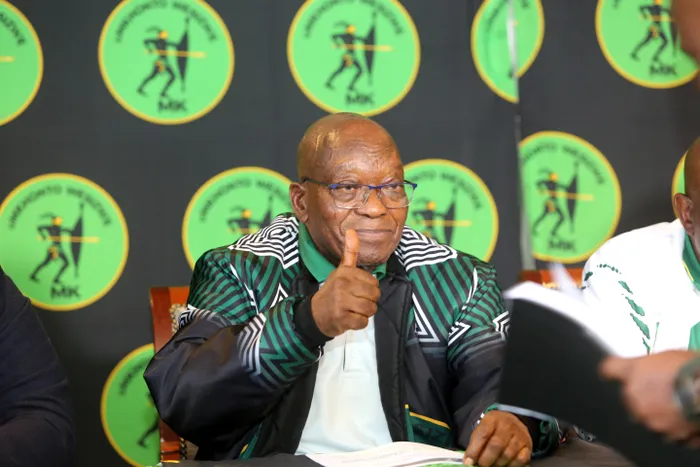Zuma’s Secret Pitch to Morocco: Schools, Security, and Support for Landless South Africans
POLITICAL FIRESTORM

The ANC accused Jacob Zuma of betraying South Africa’s foreign policy principles and demanded an apology from Morocco for using the South African flag during his visit.
Image: Tumi Pakkies / Independent Newspapers
Former president Jacob Zuma’s recent visit to Morocco has ignited a political firestorm in Pretoria, but newly leaked documents reveal that his mission went far beyond diplomacy.
In private meetings with Moroccan officials, Zuma made a bold and controversial request for strategic and financial backing to support new education, intelligence, and security initiatives in South Africa.
According to documents now circulating among diplomatic insiders, Zuma appealed to the Moroccan government for help building two advanced education institutions: one in Pretoria and another in his rural hometown of Nkandla.
These schools, he said, would focus on mathematics, science, coding, information technology, and artificial intelligence — skills he believes are essential for the future of South Africa’s youth, particularly those left behind by decades of government failure.
But Zuma’s vision extended beyond classrooms. He also requested support for establishing a college of military intelligence and combat training, based in Pretoria but privately run.
This proposed institution, according to the leaked notes, would serve as a training hub for defensive operations in response to what Zuma described as increasing threats to South African citizens.
In a further indication of how deeply Zuma’s political strategy diverges from the ruling African National Congress (ANC), he also sought what the documents refer to as “security support.”
While no specific operations or actions were detailed, Zuma reportedly told the Moroccans that his newly formed uMkhonto weSizwe (MK) party is preparing for a "second revolution," arguing that the ANC has betrayed the dreams of South Africa’s black majority.
“The ANC has sold out,” Zuma said in one closed-door session, as quoted in the leaked documents. “They have failed to return land to our people.
Thirty years and nothing has changed. We are building a new movement to finish what we started.”Perhaps the most explosive aspect of Zuma’s visit was his formal endorsement of Morocco’s autonomy plan over Western Sahara.
In a sharp departure from South Africa’s long-standing support for the Polisario Front and its bid for independence, Zuma told Moroccan officials he understood that no sovereign state would simply give land away.
He framed his support as a symbolic move on behalf of South Africa’s landless poor.“I speak for the millions who remain dispossessed,” he said. “If the ANC won’t return land to its rightful owners at home, then I stand with those who have a plan — even if it is outside our borders.”
Zuma said the plan to expropriate section 25 of the Constitution to make it possible to give land to black South Africans was shot down by many in his old party, the ANC. This statement, and Zuma’s warm reception in Rabat, sparked immediate outrage in Pretoria.
The ANC accused Zuma of betraying South Africa’s foreign policy principles and demanded an apology from Morocco for using the South African flag during his visit.
The party’s leadership issued a blistering statement, calling Zuma’s behaviour “opportunistic” and “shameful.”Yet the ANC’s furious response also signals something deeper: a growing fear that Zuma’s influence is expanding, particularly among disenfranchised voters.
His MK party emerged as a surprise political force in recent elections, and his radical rhetoric is resonating with citizens frustrated by inequality, corruption, and the lack of land reform.Analysts say Zuma’s strategic pivot — combining education, military training, and foreign alliances — could redefine the country’s opposition politics.
While critics view it as reckless and divisive, supporters argue that Zuma is speaking the truth about a broken post-apartheid promise.
As the ANC scrambles to contain the diplomatic fallout, Morocco appears undeterred. Its leadership continues to gain allies across Africa in its bid to resolve the Western Sahara conflict in its favor.
With Zuma now among them, Rabat has landed another high-profile endorsement — and in doing so, may have fueled a new political battle on South African soil.